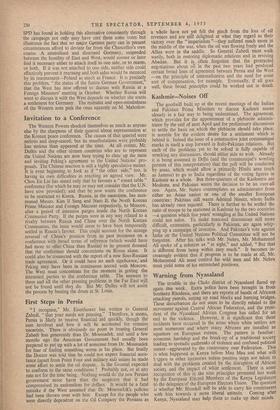First Steps in Persia
"I recognise," Mr. Eisenhower has written to General Zahedi, " that your needs are pressing." Therefore, it seems, Persia is likely to receive financial aid quickly, though the sum involved and how it will be accounted for remains uncertain. There is obviously no point in treating General Zahedi less generously than Dr. Moussadek, and until a few months ago the American Government had usually been prepared to put up with a lot of nonsense from Dr. Moussadek for fear of finding something worse in his place. But finally the Doctor was told that he could not expect financial assis- tance (apart from Point Four and military aid) unless he made some effort to settle the oil dispute. Is the General expected to conform to the same conditions ? Probably not, or at any rate not for the time being. Nothing would do the new Persian government more harm than the suspicion that it had compromised its nationalism for dollars. It would be a fatal mistake if the West assumed that Dr. Moussadek's policies had been thrown over with him. Except for the people who were directly dependent on the Oil Company the Persians as a whole have not yet felt the pinch from the loss of oil revenues and are still delighted at what they regard as their victory over the " imperialists "—they suffered much more in the middle of the war, When the oil was flowing freely and the Allies were in the saddle. So General Zahedi must walk warily, both in restoring diplomatic relations and in reviving Abadan. But it is often forgotten that the protracted negotiations about oil in the past two years had produced certain broad lines of agreement between Persia and the West —on the principle of nationalisation and the need for some sort of compensation, for example. Eventually, if all goes well, these broad principles could be worked out in detail.


































 Previous page
Previous page